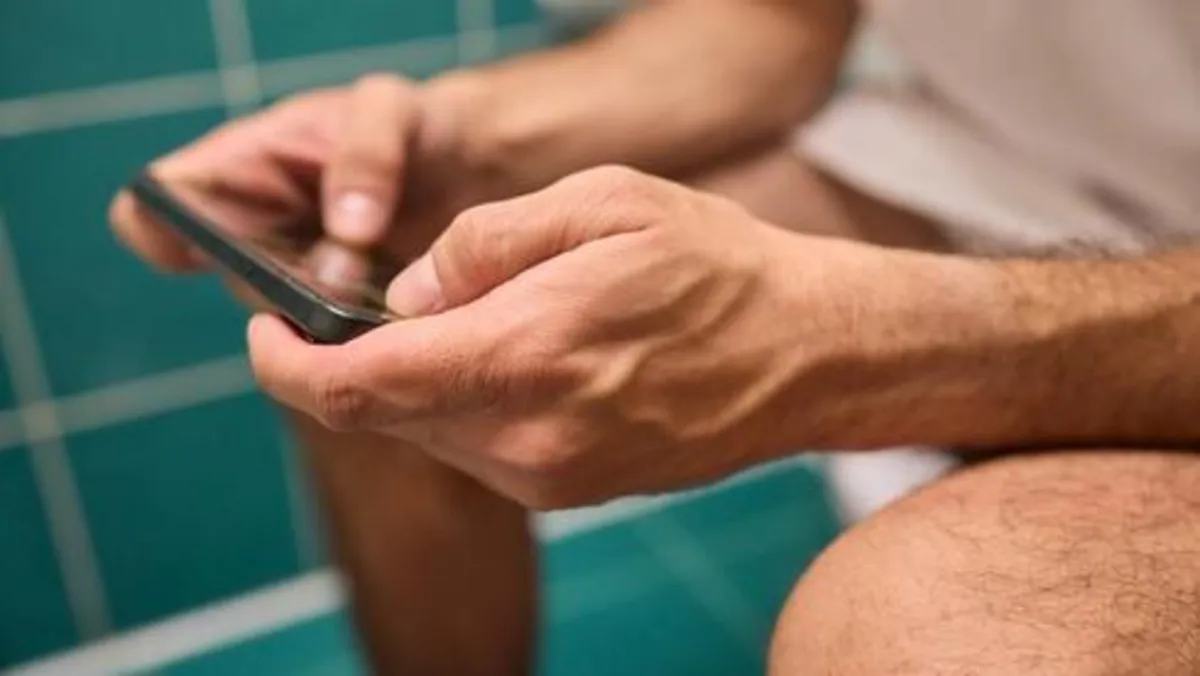
In recent years, the traditional practice of taking a newspaper or puzzle book into the restroom has been largely replaced by the ubiquitous smartphone. While this change may seem harmless, it has inadvertently led to a concerning trend: prolonged bathroom visits. Engaging with social media or reading the news can quickly cause individuals to lose track of time, resulting in unnecessary pressure on the rectum. This pressure can lead to the development of hemorrhoids, a painful condition characterized by symptoms such as itching and bleeding.
A recent study published in the medical journal PLOS One has shed light on this issue, revealing that smartphone usage in the bathroom increases the risk of developing hemorrhoids by an alarming 46%. Conducted at the prestigious Beth Israel Deaconess Medical Center, affiliated with Harvard Medical School, this research involved 125 adult participants who had undergone screening colonoscopies and completed detailed questionnaires regarding their bathroom habits, including phone usage, diet, exercise, and straining.
The study discovered that a staggering 66% of respondents used smartphones while on the toilet, and those individuals spent significantly more time in the restroom compared to non-smartphone users. More than half (54%) of smartphone users reported that they primarily engaged in reading the news, while 44% used their phones for social media. Notably, 37% of smartphone users spent over five minutes per bathroom visit, in stark contrast to just 7% of non-smartphone users.
Dr. Benjamin Person, a senior colorectal surgeon and proctologist, has been advising patients against bringing their phones into the restroom for years. He emphasizes that the longer one remains seated, the higher the risk of developing hemorrhoids. “What used to be professional intuition is now supported by research data,” he stated. While the study focused on adults aged 45 and older, Dr. Person suggests that the findings are likely applicable to younger individuals as well, as they tend to carry their phones everywhere. Alongside factors such as a low-fiber diet and obesity, toilet scrolling has emerged as another significant risk factor for hemorrhoids.
The primary issue with smartphone usage in the bathroom is the prolonged sitting. Unlike a solid chair, a toilet seat does not adequately support the pelvic floor, allowing blood to pool in the rectal area and increase pressure. This elevated pressure creates the ideal conditions for hemorrhoids to form. Furthermore, using a phone often encourages individuals to lean forward, which can hinder smooth bowel movements. In contrast, squatting provides a more favorable angle, reducing strain.
The study revealed that key risk factors were linked not to constipation or straining, but rather to the amount of time spent sitting. Passive phone use was found to lead to swelling in the rectal tissue, which can protrude and develop into hemorrhoids.
Dr. Person offers straightforward advice: “Do not take your phone into the toilet. Once it’s in your hands, you end up staying longer, thus increasing the risk of hemorrhoids.” If you must bring your phone, he recommends limiting your time in the restroom to no more than three to five minutes per visit. Setting a timer or restricting yourself to watching just two TikTok clips can help. The key takeaway is to avoid lingering on the toilet.
Another behavior that exacerbates the risk of hemorrhoids is delaying bathroom visits. Dr. Fahmi Shibli, head of the neurogastroenterology unit at Emek Medical Center, emphasizes the importance of listening to your body. “When your body tells you it’s time, you need to listen,” he advises. Ignoring the urge to go can disrupt the physiological connection between the gut and the brain, potentially leading to chronic constipation.
This issue affects individuals of all ages, often starting early in life. Children may avoid using school bathrooms due to embarrassment, while adults may hold it in at work. Women, in particular, may experience this more frequently due to hygiene concerns and societal taboos surrounding the topic.
Not all instances of delaying bathroom visits stem from embarrassment; some are rooted in fear of pain associated with conditions like fissures or hemorrhoids. Dr. Shibli warns that this fear can create a “vicious cycle” of constipation and hemorrhoids, which requires evaluation and treatment. Parents must reassure their children that asking to go to the bathroom is perfectly acceptable, while adults should prioritize their health over work-related distractions.
To maintain good bowel health, consider these practical tips:
Listen to your body and respond promptly to urges. Stay hydrated by drinking plenty of water to soften stool. Incorporate fiber-rich foods into your diet, such as vegetables, fruits, legumes, and whole grains. Maintain an active lifestyle through regular physical activity. Normalize conversations about bowel health; it’s a natural and essential topic.Interestingly, coffee can also play a role in promoting bowel health. Dr. Shibli explains that coffee stimulates the digestive system due to its caffeine content and additional compounds that activate intestinal nerve pathways. Many individuals find they need to visit the toilet shortly after consuming coffee, creating a conditioned response. However, he cautions against relying solely on caffeine or nicotine, as these can lead to dependence and are not healthy long-term solutions.
In conclusion, being mindful of your bathroom habits, especially regarding smartphone use and the tendency to delay visits, can significantly impact your bowel health. By incorporating these practical tips and fostering a healthy approach to bathroom routines, you can reduce the risk of developing hemorrhoids and maintain optimal digestive health.